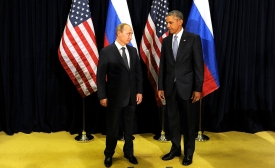russia
Anticipating criticism about including a country like Russia in the top-30, the report’s authors claimed that Moscow’s role in combatting ISIS – as well as the fact that it didn’t advance its position any further into Ukraine – appeared to help international perception. “Russia performed markedly better on the international polling in 2016, compared with 2015,” the report’s authors noted.
Russia has made its first appearance on the world's “soft power” rankings, coming in at 27th place, news website newsru.com reported Tuesday. The Soft Power 30 is an annual ranking compiled by London-based strategy firm Portland Communications. The company evaluates the influence each country exerts over others through means other than military power.
Senior officials from Georgia and Ukraine on Wednesday exhorted Nato members to bring the two nations into the alliance in order to protect them from Russia and cement ties with the West.
Surprisingly, some of these leaders, particularly in Russia and China, have been wielding a sophisticated and deceptive soft power beyond their borders that is proving more enduring and effective than in the past. Their tactics are asymmetrical and subversive, using deception and disinformation, not easily confronted.
On May 26th, Gallup announced that the Russian people’s approval of U.S. leadership dropped to arecord 1%, which is the worst rating in the world and the lowest approval Gallup has ever recorded. According to an article written by Gallup analyst Julie Ray, the abysmal view of the United States in Russia is a reflection of the country’s “…increasingly tense relations with the U.S. since the crisis in Ukraine and the threat that many Russians, as well as residents of several former Soviet states, feel the U.S. now poses to their countries.”

On the Yellow Fever outbreak and the need for a U.S.-Russia partnership.
In 2015 the WHO said that smoking is on course to kill 100 million Chinese in this century, and it warned that if the Chinese continue the habit, that rate could increase to 3 million per year by 2050 [...] From Mao Zedong to Deng Xiaoping, China has a long history of luminary smokers. However, “ashtray diplomacy” has abated thanks to a policy introduced in 2013.
Why, then, did the tsar’s forces weaken their own diplomatic case by taking away hundreds of Russian monastics? The best guess is that the entire monastic peninsula was on the verge of veering out of control because of the theological dispute which had been gathering pace for several years...







